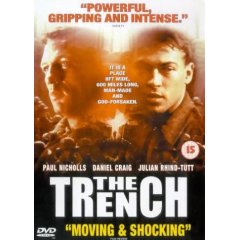Plot
In the summer of 1916, Lance Corporal Dell shows his collection of nude photos to the men of his platoon. Private Billy MacFarlane remarks to his brother Eddie that one of the girls looks familiar to him. The platoon commander, Lieutenant Harte, informs Sergeant Winter that the platoon will be "going over" in the third wave of the upcoming summer offensive, carrying supplies in relative safety. Eddie is reprimanded during night sentry duty by Sergeant Winter for trying to look through a hole in the trench. Billy annoys Eddie afterwards with questions about the girl from the photo and convinces himself it was a young woman named Maria who worked at the Post Office. After morning stand-to, the platoon eggs Eddie on to look through the hole. He sees a scene of relative peace and beauty before being shot in the jaw and neck. Billy is unconsolable as Eddie is taken away on a stretcher.
A Colonel and Public Affairs officers stage a motivational scene with the men, the Colonel telling them the battle will be easy because the German army has been relentlessly bombarded. After an awkward, forced speech, the men are told to cheer. As the Colonel leaves wishing them luck, Private Daventry remarks that he will not be with them. Winter takes him aside and harshly admonishes him for his disrespect. Billy encounters the blasted remains of two privates sent on an errand, dismembered by a shell.
Harte informs Winter that the company commander has ordered a night patrol to bomb the German trench and review the status of their defenses. Winter takes Private Beckwith to bomb the trench, and they capture a German soldier trying to flee. Lance Corporal Dell harasses the prisoner and Daventry speaks to him briefly in German. He tells the platoon that the Germans have clearly not been wiped out as the Colonel said, and are in good spirits.
On the morning of the attack, Lieutenant Harte informs Winter that because another platoon has got lost during the night, they will be going over in the first wave instead. Winter sends Dell to retrieve the platoon's rum ration, but Dell drops it in shock after seeing a wounded man being carried past. He drinks a large amount before a shell knocks him down and breaks the bottle and returns to Winter drunk. Winter requests Harte relinquish his personal whisky for the men, and after refusing, he relents as the men line up. MacFarlane tells Winter he is afraid to go over the top and Winter reassures him he is the type who will make it. MacFarlane looks again at the stolen picture of the girl he believes he knows from the Post Office.
The men go over the top into intense gunfire. Winter is immediately shot in the leg, tries to hide it as he helps MacFarlane out of the trench, is shot several more times and falls back onto MacFarlane. The men struggle out into no man's land where they are shot down, including MacFarlane.
This page is based on this
Wikipedia article Text is available under the
CC BY-SA 4.0 license; additional terms may apply.
Images, videos and audio are available under their respective licenses.
